

Attachment 1. Becoming a Critic Of Your Thinking. Learning the Art of Critical Thinking There is nothing more practical than sound thinking.
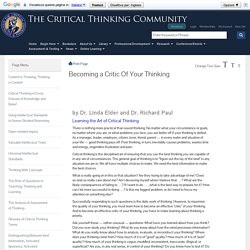
No matter what your circumstance or goals, no matter where you are, or what problems you face, you are better off if your thinking is skilled. As a manager, leader, employee, citizen, lover, friend, parent — in every realm and situation of your life — good thinking pays off. The Trivium Method - Gene Odening (entire) - what you should have been taught in school but weren't. The%20Trivium%20 %20The%20Liberal%20Arts%20of%20Logic,%20Grammar,%20and%20Rhetoric%20 %20Sister%20Mirriam%20Joseph. A List Of Fallacious Arguments. Critical Thinking Course: Corbett essay: Reflections on William James' essay. Bob Corbett Class lecture.
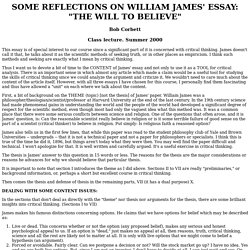
Summer 2000 This essay is of special interest to our course since a significant part of it is concerned with critical thinking. James doesn't call it that, he talks about it as the scientific methods of seeking truth, or in other places as empiricism. I think such methods and seeking are exactly what I mean by critical thinking. Thus I want us to devote a bit of time to the CONTENT of James' essay and not only to use it as a TOOL for critical analysis. First, a bit of background on the THEME (topic) [not the thesis] of James' paper. James also tells us in the first few lines, that while this paper was read to the student philosophy club of Yale and Brown Universities -- undergrads -- that it is not a technical paper and not a paper for philosophers or specialists. The thesis is James' answer to this question in 15 words or less.
It is important to note that section I introduces the theme as I did above. James makes his famous distinctions concerning options. Teaching Critical Thinking (pdf) CriticalThinking.pdf. Critical Thinking On The Web. Top Ten Argument Mapping Tutorials.

Six online tutorials in argument mapping, a core requirement for advanced critical thinking.The Skeptic's Dictionary - over 400 definitions and essays. The Fallacy Files by Gary Curtis. Best website on fallacies. Butterflies and Wheels. What is critical thinking? Nobody said it better than Francis Bacon, back in 1605: For myself, I found that I was fitted for nothing so well as for the study of Truth; as having a mind nimble and versatile enough to catch the resemblances of things … and at the same time steady enough to fix and distinguish their subtler differences; as being gifted by nature with desire to seek, patience to doubt, fondness to meditate, slowness to assert, readiness to consider, carefulness to dispose and set in order; and as being a man that neither affects what is new nor admires what is old, and that hates every kind of imposture.
A shorter version is the art of being right. 15 Styles of Distorted Thinking. Thinking tools resources. Weak versus Strong Critical Thinking Critical thinking involves basic intellectual skills, but these skills can be used to serve two incompatible ends: self-centeredness or fair-mindedness.
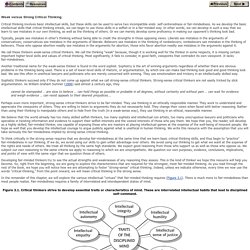
As we develop the basic intellectual skills that critical thinking entails, we can begin to use those skills in a selfish or in a fair-minded way. In other words, we can develop in such a way that we learn to see mistakes in our own thinking, as well as the thinking of others. Or we can merely develop some proficiency in making our opponent's thinking look bad. Typically, people see mistakes in other's thinking without being able to credit the strengths in those opposing views. We call these thinkers weak-sense critical thinkers.
Another traditional name for the weak-sense thinker is found in the word sophist. Sophistic thinkers succeed only if they do not come up against what we call strong-sense critical thinkers. Perhaps even more important, strong-sense critical thinkers strive to be fair-minded. Thou shalt not commit logical fallacies. The Star Test. Why does the star test work?
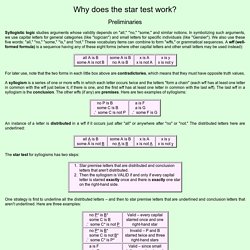
Preliminaries Syllogistic logic studies arguments whose validity depends on "all," "no," "some," and similar notions. In symbolizing such arguments, we use capital letters for general categories (like "logician") and small letters for specific individuals (like "Gensler").
We also use these five words: "all," "no," "some," "is," and "not. " These vocabulary items can combine to form "wffs," or grammatical sequences. Taxonomy of the Logical Fallacies. Promoting critical thinking and skepticism about the central beliefs of society. Top 10 Thinking Traps Exposed. Our minds set up many traps for us. Unless we’re aware of them, these traps can seriously hinder our ability to think rationally, leading us to bad reasoning and making stupid decisions.
Features of our minds that are meant to help us may, eventually, get us into trouble. Here are the first 5 of the most harmful of these traps and how to avoid each one of them. 1. The Anchoring Trap: Over-Relying on First Thoughts “Is the population of Turkey greater than 35 million? Lesson: Your starting point can heavily bias your thinking: initial impressions, ideas, estimates or data “anchor” subsequent thoughts. This trap is particularly dangerous as it’s deliberately used in many occasions, such as by experienced salesmen, who will show you a higher-priced item first, “anchoring” that price in your mind, for example. What can you do about it? Always view a problem from different perspectives. 2. Consider the status quo as just another alternative. 3. Be OK with making mistakes. 4. 5. Top 10 Logical Fallacies in Politics. The human brain is wired all wrong.
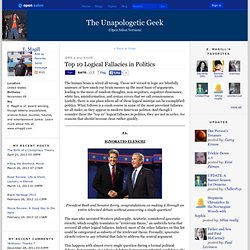
Those not versed in logic are blissfully unaware of how much our brain messes up the most basic of arguments, leading to the mess of random thoughts, non-sequiturs, cognitive dissonance, white lies, misinformation, and syntax errors that we call consciousness. Luckily, there is one place where all of these logical misteps can be exemplified: politics.
What follows is a crash course in some of the most prevelant fallacies we all make, as they appear in modern American politics. And though I consider these the "top 10" logical fallacies in politics, they are not in order, for reasons that should become clear rather quickly. President Bush and Senator Kerry, congratulations on making it through an entire televised debate without answering a single question! The man who invented Western philosophy, Aristotle, considered ignoratio elenchi, which roughly translates to "irrelevant thesis," an umbrella term that covered all other logical fallacies. Graham Priest on Revising Logic.